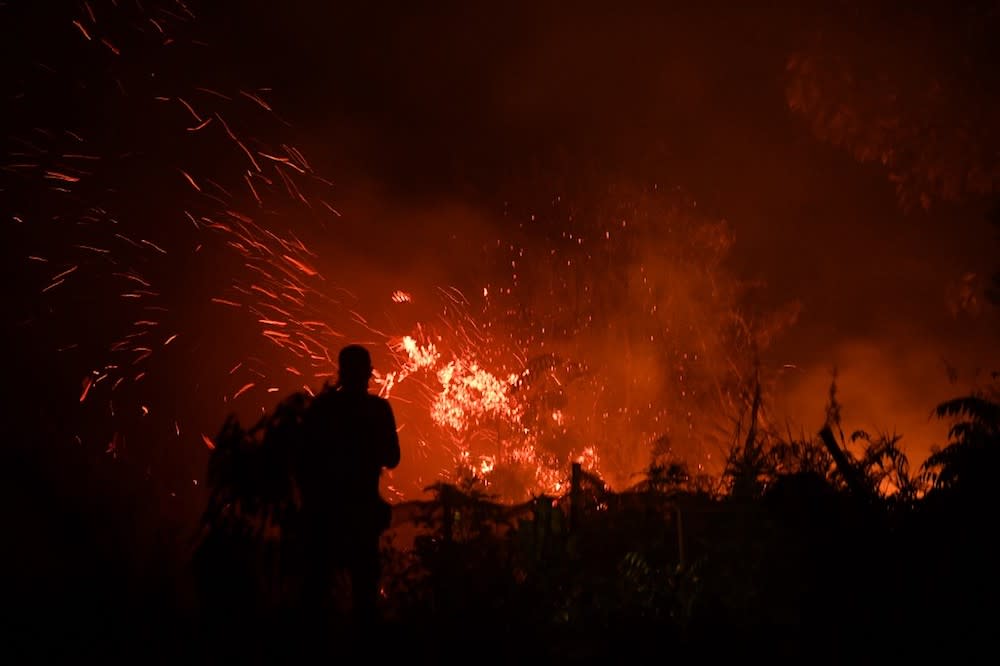Nearly 74,000 fire hotspots in Indonesia and Malaysia alone, says palm oil industry NGO

KUALA LUMPUR, Sept 20 — The Roundtable on Sustainable Palm Oil (RSPO) has detected a total of 73,508 hotspots in both Malaysia and Indonesia, as of September 16.
Its chief executive officer Datuk Darrel Webber said of the hotspots, 278 are within RSPO member concessions, which is approximately 0.40 per cent of all hotspots detected.
“Of the 0.4 per cent of hotspots within members’ concessions, 21 per cent of them are by certified members, with the remainder by non-certified members,” he said during a press conference today.
Webber said hotspot conditions in Sumatra and Kalimantan are expected to persist, based on the current forecast, due to drier-than-usual and warmer conditions forecast for the coming fortnight.
“Depending on the prevailing winds and the extent of the smoke haze there, further occurrences of transboundary haze can be expected in peninsula Malaysia, Singapore, and East Malaysia.
“This is consistent with recent weather and seasonal patterns in Indonesia and Malaysia, contributing to conditions that cause hotspots and forest fires. This has resulted in haze and other negative environmental impacts that much of the region are currently experiencing,” he said.
Webber said that in line with the NGO’s objective of promoting the growth and use of sustainable palm oil products, its Investigation and Monitoring Unit is actively following up with each RSPO member, whenever a hotspot is detected in their concession.
“We have been in contact with the members allegedly linked to the recent fires in Indonesia for further information and verification. As of now, the respective certification bodies will conduct necessary investigations.
“If an RSPO member is found to have intentionally used fire to clear land, we will use our Complaints System to deal with the matter, which can have repercussions such as membership suspension,” he said, adding that if the situation is severe enough, members can potentially face termination.
When asked to explain the difference between certification and non-certification, Webber said it depends on the size of the company that wishes to join RSPO.
“Some can get certification almost immediately if they are small enough, but others do not, such as companies which have large landbanks of up to a million hectares, sometimes in different locations.
“This means more time is needed before certification can be issued. However pending that, they are regarded as full RSPO members and as such must comply with our regulations,” he said.
The Roundtable also keeps tabs on whether slash-and-burn farming methods that are being used by its members, which is a major factor in contributing to the haze problem.
“This is done mainly by our certification bodies whenever they go down to conduct auditing. All of our members are required to go through new planting procedures, and must also submit reports on issues such as the previous usage of the land intended for plantation, and others.
“Fire — whether intentionally set for land clearing or accidental — is prohibited under the RSPO standard, and is an issue we take very seriously due to its impact on communities and the environment,” Webber said.
Noting that the fires pose a great risk to the surrounding communities, he said it is vital for RSPO and other quarters, including the government, civil society and the private sector, to work together in extinguishing them.
The ongoing transboundary haze and fire problem has resulted in Jakarta, via the Forestry and Environment Ministry, of accusing the Indonesian timber and plantation industries of lacking commitment in preventing fires on their land.
Related Articles Forest fires cause Sri Aman API to hit hazardous level Report: Haze eating up businesses as restaurant owners see diners decline Cloud seeding to be carried out in Sarawak for two days from tomorrow



